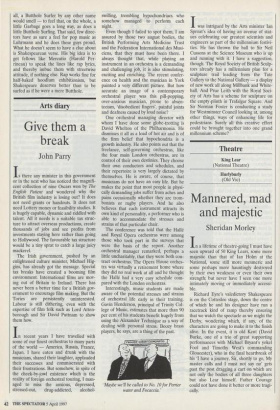Arts diary
Give them a break
John Parry
Is there any minister in this government or in the next who has noticed the magnifi- cent collection of nine Oscars won by The English Patient and wondered why the British film industry is losing out? It does not need grants or handouts. It does not need Lottery money or feasibility studies. It is hugely capable, dynamic and riddled with talent. All it needs is a suitable tax struc- ture to attract overseas productions, create thousands of jobs and see profits from investments staying here rather than going to Hollywood. The favourable tax structure would be a tiny sprat to catch a large juicy mackerel.
The Irish government, pushed by an enlightened culture minister, Michael Hig- gins, has already got the message. Special tax breaks have created a booming film environment. International films are mov- ing out of Britain to Ireland. There has never been a better time for a British gov- ernment to encourage film making. But the Tories are persistently uninterested. Labour is still dithering, even with the expertise of film folk such as Lord Atten- borough and Sir David Puttnam to show them how.
In recent years I have travelled with some of our finest orchestras to many parts of the world — America, Russia, France, Japan. I have eaten and drunk with the musicians, shared their laughter, applauded their successes and commiserated with their frustrations. But somehow, in spite of the cheek-by-jowl existence which is the reality of foreign orchestral touring, I man- aged to miss the anxious, depressed, stressed-out, drug-addicted, alcohol- swilling, trembling hypochondriacs who somehow managed to perform each night.
Even though I failed to spot them, I am assured by those two august bodies, the British Performing Arts Medicine Trust and the Federation International des Musi- ciens, that they must have been there. I always thought that, while playing an instrument in an orchestra is a demanding and challenging job, it is also stimulating, exciting and enriching. The recent confer- ence on health and the musician in York painted a very different picture. But how accurate an image of a contemporary orchestral player was this pill-popping, over-anxious musician, prone to absen- teeism, 'disobedient fingers', painful joints and deafness caused by loud noise?
One orchestral managing director with whom I have done some globe-trotting is David Whelton of the Philharmonia. He dismisses it all as a load of hot air and is of the firm belief that hypochondria is a growth industry. He also points out that the freelance, self-governing orchestras, like the four main London orchestras, are in control of their own destinies. They choose their own conductors and schedules, and their repertoire is very largely dictated by themselves. He is aware, of course, that musicians do not have an easy life. But he makes the point that most people in physi- cally demanding jobs suffer from aches and pains occasionally whether they are trom- bonists or rugby players. And he also believes that each instrument attracts its own kind of personality, a performer who is able to accommodate the stresses and strains of that particular chair.
The conference was told that the Halle and Royal Opera orchestras were among those who took part in the surveys that were the basis of the report. Another orchestral manager remarked, perhaps a little uncharitably, that they were both con- tract orchestras. The Opera House orches- tra was virtually a retirement home where they did no real work at all and he thought the Halle had a very easy schedule com- pared with the London orchestras.
Interestingly, music students are made aware of the potential stresses and strains of orchestral life early in their training. Gavin Henderson, principal of Trinity Col- lege of Music, estimates that more than 90 per cent of his students benefit hugely from using the Alexander Technique as a way of dealing with personal stress. Boozy brass players, he says, are a thing of the past.
Maybe we'll be called to No. 10 for Perrier water and Focaccia.' Iwas intrigued by the Arts minister Ian Sproat's idea of having an avenue of stat- ues celebrating our greatest scientists and engineers as part of the millennium festivi- ties. He has thrown the ball to Sir Neil Cussons at the Science Museum who is up and running with it. I have a suggestion, though. The Royal Society of British Sculp- tors already has a millennium plan for a sculpture trail leading from the Tate Gallery to the National Gallery — a display of new work all along Millbank and White- hall. And Prue Leith with the Royal Soci- ety of Arts has a scheme for sculpture on the empty.plinth in Trafalgar Square. And Sir Norman Foster is conducting a study for Westminster Council looking at, among other things, ways of enhancing life for pedestrians. Surely all this creative effort could be brought together into one grand millennium scheme?


























































 Previous page
Previous page